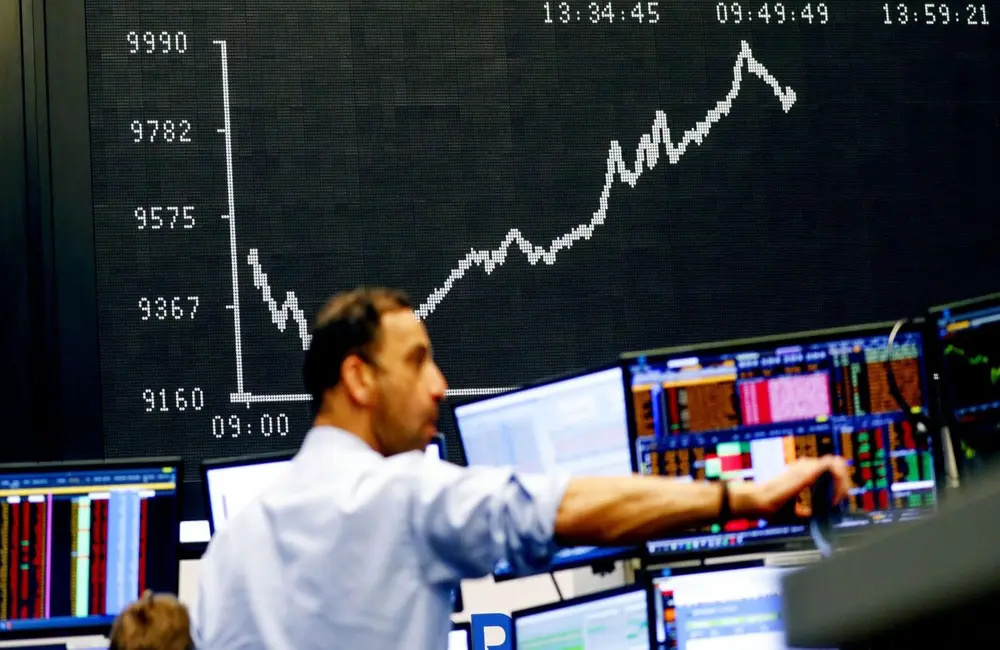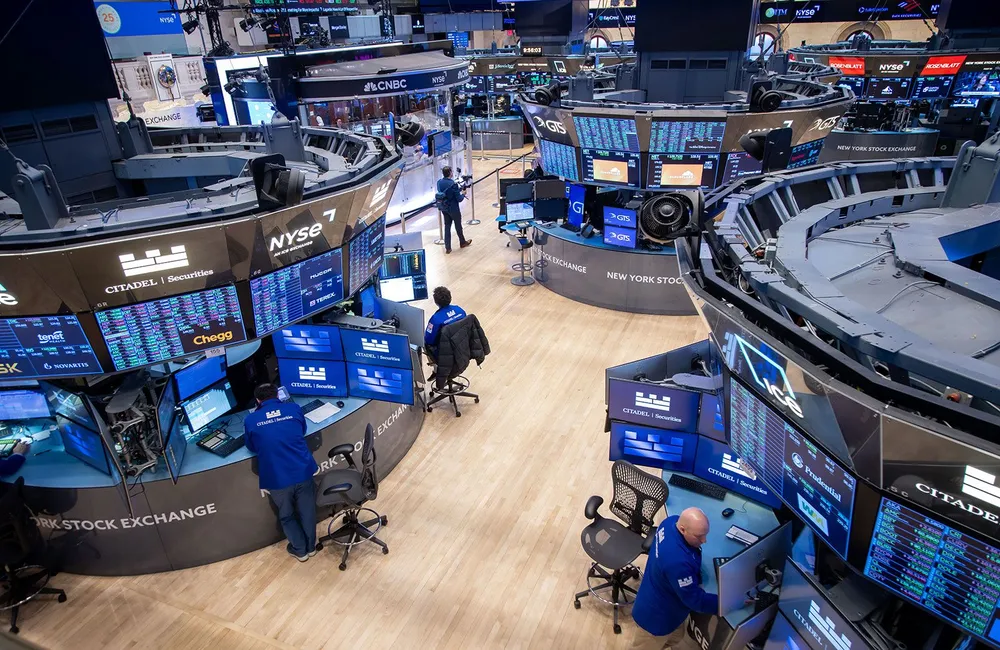Meanwhile, European inflation came down more than expected last month.
ASX futures were 42 points or 0.6% higher as of 6:00am on Friday, suggesting a positive open.
Major US indices jumped on the first trading day of June as investors cheered progress toward a deal to avert a government default.
The tech-heavy Nasdaq Composite led the way, adding 1.3% and building on strong gains from May. The S&P 500 added 1.0%. The Dow Jones Industrial Average added 153 points, or 0.5%.
Thursday's trading activity underscored a continuing divergence: The tech-heavy Nasdaq outperformed the Dow by 0.81 percentage points after beating the blue-chip index in May by its widest monthly margin since October 2001.
A whirl of good news on the debt ceiling impasse and the US economy gave the market a boost in trading. On Wednesday, a bill to avoid a default passed through the House of Representatives. The bill will next head to the Senate.
Meanwhile, fresh data showed that the jobs market remains strong. Hiring was robust again in May, with nonfarm private-sector employment rising by 278,000. Jobless-claims data showed that worker filings for unemployment benefits remain historically low.
In commodity markets, Brent crude oil gained 2.3% to US$74.29 a barrel while gold added 0.8% to US$1,977.93.
Australian government bonds were higher, with the 2 Year yield increasing to 3.57% and the 10 Year yield rising to 3.61%. US Treasury notes were also higher, with the 2 Year yield climbing to 4.34% and the 10 Year yield rising to 3.61%.
The Australian dollar increased to 65.76 US cents from its previous close of 65.03. The Wall Street Journal Dollar Index, which tracks the US dollar against 16 other currencies, edged down to 97.47.
Asia
Chinese shares ended broadly higher after a private gauge of factory activity bounced back to expansion in May. The Caixin manufacturing purchasing managers index rose to 50.9 in May from 49.5 in April, diverging from the official PMI released Wednesday, which showed a deeper contraction. Software and telecom stocks led gains. Beijing Kingsoft Office Software rose 9.0% and China United Network Communications gained 2.0%. Chip makers and developers declined. NAURA Technology Group fell 2.2% and China Vanke was off 1.7%. The Shanghai Composite Index ended flat at 3204.63, the Shenzhen Composite Index rose 0.45% and the ChiNext Price Index ended 0.6% higher.
Hong Kong shares ended lower, reversing morning gains, with property stocks and consumption companies weighing on the market. Longfor Group Holdings was 3.7% lower and China Resources Beer dropped 2.5%. Tech companies were among the gainers. The Hang Seng Tech Index ended 0.1% higher, with Meituan rising 2.4% and Tencent Holdings adding 1.55%. The benchmark Hang Seng Index dropped 0.1% to 18216.91.
Japanese shares ended higher, led by gains in tech and bank stocks, as concerns eased about a potential US government default. SoftBank Group advanced 4.6% and Mitsubishi UFJ Financial Group climbed 3.4%. The Nikkei Stock Average gained 0.8% to 31148.01.
India's benchmark Sensex closed 0.3% lower at 62428.54 amid weak sentiment due to a lack of global cues, ICICI Direct Research analysts said in a note. Decliners included Bharti Airtel, which closed 3.4% lower; Kotak Mahindra Bank, which fell 3.3%; and ICICI Bank, which declined 1.3%. Gainers included Tata Motors, which rose 1.7%.
Europe
European stocks rose Thursday as investors cheered lower-than-expected eurozone inflation data. The pan-European Stoxx Europe 600 gained 0.8%, the German DAX advanced 1.2% and the French CAC 40 climbed 0.6%.
Thursday's eurozone inflation data, which showed that both headline and core inflation slowed by more than forecast in May, gave investors "cause for optimism," Oanda analyst Craig Erlam wrote. If there are further signs of moderating inflation in coming months, the European Central Bank should feel comfortable enough to bring its interest rate rise cycle to an end, he noted.
The United Kingdom’s FTSE 100 index closed Thursday up 0.6%, in line with global peers, as investors’ focus moved away from the US debt ceiling and toward the broader economic outlook, amid increasing signs that inflation is slowing, CMC Markets analyst Michael Hewson said in a note.
The rebound in commodities supported miners and oil-exposed stocks, with Fresnillo closing up 4.5%, leading the British index higher. Retailer B&M shares chased yesterday's gains and rose 3.8%, reaching 13-month highs after its FY 2023 earnings report, followed by Melrose Industries, up 3.8%. The digital automotive marketplace Auto Trader was among the worst performers, down 3.4% after its FY 2023 report.
North America
Major US indices jumped on the first trading day of June as investors cheered progress toward a deal to avert a government default.
The tech-heavy Nasdaq Composite led the way, adding 1.3% and building on strong gains from May. The S&P 500 added 1.0%. The Dow Jones Industrial Average added 153 points, or 0.5%.
Thursday's trading activity underscored a continuing divergence: The tech-heavy Nasdaq outperformed the Dow by 0.81 percentage points after beating the blue-chip index in May by its widest monthly margin since October 2001.
A whirl of good news on the debt ceiling impasse and the US economy gave the market a boost in trading. On Wednesday, a bill to avoid a default passed through the House of Representatives. The bill will next head to the Senate.
Meanwhile, fresh data showed that the jobs market remains strong. Hiring was robust again in May, with nonfarm private-sector employment rising by 278,000. Jobless-claims data showed that worker filings for unemployment benefits remain historically low.
Many investors have eased up on bets that the Federal Reserve would raise interest rates again in June, helping drive the stock market higher, traders said. Two policy makers on Wednesday publicly underscored their preference to forgo a hike at the June meeting, barring a sizzling jobs report on Friday. Investors are now betting on a roughly 30% chance that the central bank raises interest rates this month, down from around 50% a week ago, according to CME Group data.
"Things aren't deteriorating as fast as everyone expected," said Danny Kirsch, head of options at Piper Sandler. "People are finding less reasons to be hedged, or to be short."
Thursday's rally was broad-based, with shares of everything from energy companies and cruise lines to technology stocks jumping. Shares of Nvidia, which have been on a hot streak, added 5.1%, making the stock one of the S&P 500's best performers again. Shares of Meta Platforms and Amazon.com gained 3% and 1.8%, respectively.
Brian Bost, co-head of equity derivatives at Barclays, said the recent stock market moves are reminiscent of 2020, when stocks tied to everything from software companies to chip makers surged. Large institutional investors have rushed to profit from the tech rally, he said, which has helped drive mammoth one-day moves in individual tech stocks.
Retail stocks fell Thursday, badly underperforming the broader market. Shares of Dollar General dropped almost 20% after the company's weak forecast. Its executives blamed worse-than-expected macroeconomic forces, saying that lower-income customers were caught off guard by lower tax refunds and a reduction in food-stamp benefits.
Data on Thursday showed that activity in the manufacturing sector contracted for a seventh consecutive month in May, according to the Institute for Supply Management. Still, ISM's prices index recorded a big drop, a sign that raw materials prices slipped last month.





















